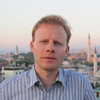Wowereit and Black Wolf
Although homosexuality is not illegal in Turkey, it is not widely accepted, as was the case in Western Europe until recently. In Germany, it took a 2001 mayor in Berlin to advance recognition. In Turkey, this role could fall to a young female volleyball player.
While the title may sound a bit like Winnetou and Old Shatterhand, this is no story of cowboys and Native Americans, but rather one of former Berlin mayor Klaus Wowereit and Turkish volleyball player Ebrar Karakurt (meaning black wolf). Societal change is measured in millimeters and it needs people, such as Wowereit and Karakurt, to turn millimeters into centimeters.
In recent years, the recognition and acceptance of homosexuality has been a criterion that conservatives in Western Europe, who formerly fought against such recognition, like to use to label Muslims and Eastern Europeans (Poland, Hungary) as ‘backwards.’ This remarkable turn of events distracts from the newness of such acceptance in Western European countries.
In Germany, homosexuality was illegal until 1969 via article 175 of the penal code carried over from the Nazi era post-WW2. Article 175 was only abolished in 1994. Thus, any kind of ‘coming out’ in the 60s and 70s was very difficult, because it was equivalent to confessing to a crime. That is why, initially, only people like film director Rosa von Praunheim came out, who explicitly worked toward the realization of gay rights. He disliked the non-outing of prominent gay individuals and eventually outed some of them himself. These were exclusively artists and TV stars.
An increase in recognition on a broader social level only came to fruition in the early 2000s, when the little-known Klaus Wowereit became the SPD candidate for mayor of Berlin. Wowereit's homosexuality was only known to insiders and some journalists. He attended events with his partner, but did not publicly come out. Before the party congress where he was to be nominated, he was told by journalists that if he did not, they would make his sexuality public. In June 2001, at the end of his candidacy speech, Wowereit added, "I'm gay, and that's also fine." Wowereit won the election that year and was re-elected two more times after. Through his representation, having an openly gay person hold a high representative position became more normal. In the years following, there was an openly gay mayor of Hamburg from the CDU, an FDP chairperson and foreign minister (now health minister), and a conservative CDU politician. Without Wowereit, this progress could have happened, but perhaps more slowly, more cautiously.
Such an unexpected ‘Wowereit moment’ could have happened in Turkey in August. Ebrar Karakurt, a 21-year-old volleyball player, posted a photo embracing her girlfriend on her Instagram account, which has some 675,000 followers. She did not caption the photo, nor did she comment on it. She later deleted the photo after a torrent of homophobic remarks came in response. The conservative religious press and Islamic preachers like Cübbeli Ahmet criticized the behavior as immoral and accused her of encouraging homosexuality.
There was some support from fellow female team members and liberal, leftist Turks. The Turkish National Volleyball Federation’s spokesman Kurtaran Mumcu said, “Ebrar Karakurt is among the most important and promising players [in] Turkish volleyball. Everyone's personal life concerns them alone." She proved to be a promising player on August 18 in the first match of the European Championship, when she contributed 26 points in the match against Romania and was voted the best player of the match.
For this to have been a Wowereit moment, more popular Turks would have needed to follow her. Not only those associated with sports, but also those in politics and large corporations. Such widespread support takes time, as it entails risks: loss of job, exposure to hatred, verbal and physical attacks, and social isolation. However, it is not a question of if, but when others will follow her.
The volleyball team was previously targeted during the Olympic Games in Tokyo, because of their uniforms and confident behavior. Ihsan Senocak addressed the women’s volleyball team, The Sultans of the Net, by saying, “Daughters of Islam! You are the sultans of faith, chastity, morality and modesty… not of sports. You are the children of mothers who are ashamed to so much as expose their noses.”
While this could have been a passing comedic criticism, Senocak has almost a million followers on Twitter. Thus, it is instead a sign of the deep cleavages in Turkish society and the disconnect from those with different ways of life. It is also a sign of 20 years of the AKP ruling the country with an agenda of creating a devout, conservative generation.
Ebrar Karakurt is only 21. She could become one of the best volleyball players of her generation, if she is not already, as well as a role model and icon, not only for lesbian women, but women and men who long for a Turkey that accepts differences and all sexual orientations as normal. With her latest Instagram post, she has thus taken on a great social responsibility.
The only strange thing about Karakurt is neither her constantly-changing hair nor her sexual orientation, but the name of her current volleyball club: Igor Gorgonzola Novara.

